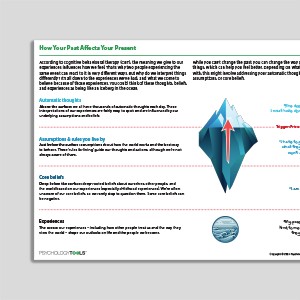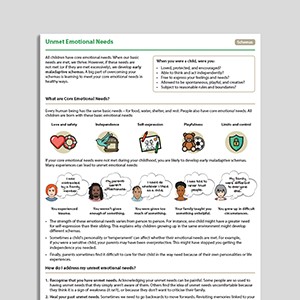How Your Past Affects Your Present (Schema Therapy)
Schema therapy posits that many longstanding psychological difficulties stem from unmet core emotional needs, the early maladaptive schemas (EMS) they give rise to, and characteristic responses to them (referred to as ‘coping styles’). Using the metaphor of an iceberg, How Your Past Affects Your Present is designed to introduce these key concepts to clients, helping to support case conceptualization and psychoeducation.
Download or send
Related resources
Tags
Languages this resource is available in
Techniques associated with this resource
Mechanisms associated with this resource
Introduction & Theoretical Background
A brief introduction to schema therapy
Schema therapy is an integrative therapy initially developed for treating complex, longstanding, and diffuse psychological difficulties. It combines cognitive, behavioral, attachment, gestalt, object relationships, constructivist, psychoanalytic, and neurobiological approaches within a unifying conceptual model (Young, 1990, 1999; Young et al., 2003). Additional interventions have since been incorporated, such as EMDR (Young et al., 2002), mindfulness (van Vreeswijk et al., 2014), and body-focused methods (Briedis & Startup, 2020). Schema therapy expands on CBT by emphasizing the developmental origins of psychological problems, incorporating relational and experiential interventions, and targeting the maladaptive coping styles that perpetuate these difficulties (Young et al., 2003).
Early maladaptive schemas
Schemas are enduring and foundational mental structures that play an essential role in cognitive processing, enabling humans to represent the complexities of the world (Rafaeli et al., 2016). By simplifying reality, they make the vast array of information we encounter manageable, enabling
Therapist Guidance
"A key idea in schema therapy is that personal difficulties sometimes stem from painful early maladaptive schemas and how people try to cope with them. However, people aren’t born with schemas: they develop them in response to emotional needs that weren’t met during their early lives. Can we use this handout to explore how these ideas fit together?"
Clients may find it easiest to begin at the top level and work downwards. The iceberg can be used as a metaphor for the ‘visibility’ of each schema component.
- Unhelpful patterns in your life. These are the problems people struggle with in their adult lives, and often mirror attempts to cope with early maladaptive schemas. Clients may already be aware of negative themes, patterns, or ‘traps’ in their lives: likening this to seeing the tip of an iceberg above water encourages them to examine the ‘deeper’ schema components that lie under
References And Further Reading
- Alba, J., Calvete, E., Wante, L., Van Beveren, M. L., & Braet, C. (2018). Early maladaptive schemas as moderators of the association between bullying victimization and depressive symptoms in adolescents. Cognitive Therapy and Research, 42, 24-35. DOI: 10.1007/s10608-017-9874-5.
- Arntz, A., Rijkeboer, M., Chan, E., Fassbinder, E., Karaosmanoglu, A., Lee, C. W., & Panzeri, M. (2021). Towards a reformulated theory underlying schema therapy: Position paper of an international workgroup. Cognitive Therapy and Research, 45, 1007-1020. DOI: 10.1007/s10608-021-10209-5.
- Bach, B., Lockwood, G., & Young, J. E. (2018). A new look at the schema therapy model: organization and role of early maladaptive schemas. Cognitive Behaviour Therapy, 47, 328-349. DOI: 10.1080/16506073.2017.1410566.
- Beck, A. T. (2015). Theory of personality disorders. In A. T. Beck, D. D. Denise, & A. Freeman (Eds.), Cognitive therapy of personality disorders (3rd ed.) (pp.19-62). Guilford Press.
- Beck, A. T., Freeman, A., & Davis, D. D. (2004). Cognitive therapy of




